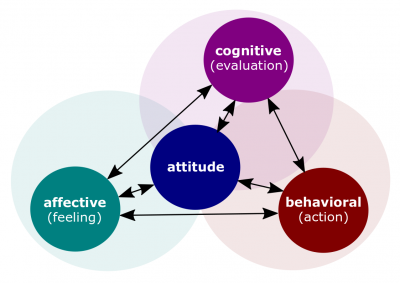Difference between revisions of "Attitude"
(→Related coursework) |
MariamKhalid (talk | contribs) |
||
| Line 4: | Line 4: | ||
According to [[Organizational Behavior by Robbins and Judge (17th edition)]], | According to [[Organizational Behavior by Robbins and Judge (17th edition)]], | ||
:[[Attitude]]. An evaluative statement or judgment concerning objects, people, or events. | :[[Attitude]]. An evaluative statement or judgment concerning objects, people, or events. | ||
| + | According to [[Management by Robbins and Coulter (14th edition)]], | ||
| + | :[[Attitude]]. An evaluative statement, either favorable or unfavorable, concerning objects, people, or events. | ||
| + | |||
==Components== | ==Components== | ||
| Line 13: | Line 16: | ||
*[[Individual Decisions Quarter]]. | *[[Individual Decisions Quarter]]. | ||
| − | [[Category: Septem Artes Administrativi]][[Category: Articles]] | + | [[Category:Management]][[Category: Septem Artes Administrativi]][[Category: Articles]] |
Revision as of 08:42, 3 June 2020
Attitude is an evaluative statement or judgment, either favorable or unfavorable, concerning objects, people, or events.
Definitions
According to Organizational Behavior by Robbins and Judge (17th edition),
- Attitude. An evaluative statement or judgment concerning objects, people, or events.
According to Management by Robbins and Coulter (14th edition),
- Attitude. An evaluative statement, either favorable or unfavorable, concerning objects, people, or events.
Components
- Cognitive component. That part of an attitude that's made up of the beliefs, opinions, knowledge, or information held by a person. In other words, the cognitive component is the opinion or belief segment of an attitude.
- Affective component. The emotional or feeling segment of an attitude.
- Behavioral component. The segment of an attitude that refers to an intention to behave in a certain way toward someone or something.
